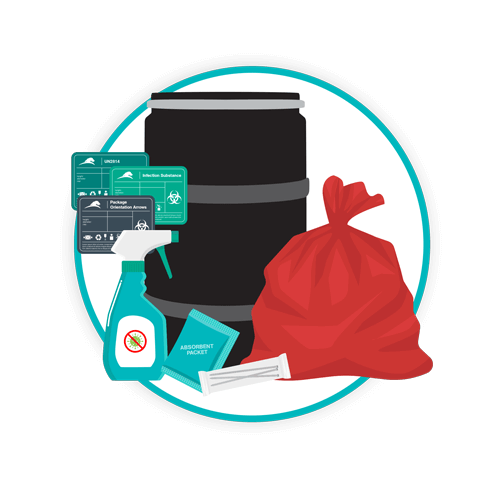What Is Category A Infectious Waste?
Category A waste is defined as an infectious waste that is reasonably expected to contain pathogens capable of causing permanent disability or life-threatening or fatal disease.
Examples of Category A Infectious Waste include:
- Ebola
- Certain Mpox (formerly known as Monkeypox) clades
- Zika Virus
- Lassa Fever
When healthcare facilities so much as suspect they are encountering a patient with an infection that generates Category A waste, the waste must be treated as such, with extreme caution, until tests confirm the infection or indicate otherwise.
 How Is Category A Waste Handled?
How Is Category A Waste Handled?
This specific type of regulated medical waste has unique requirements for handling and transportation governed by the Pipeline and Hazardous Materials Safety Administration (PHMSA), part of the US Department of Transportation. Some of those specific requirements are described here:
- A special permit must be granted by the PHMSA to transport Category A waste.
- The waste generator must follow strict packaging requirements (see below).
- Each waste collection service must be pre-approved by the PHMSA, stating date, time, treatment location, and more.
- A dedicated truck must collect the waste and drive directly to the destination facility.
-
The PHMSA must be notified when the waste reaches the destination facility.
Packaging Requirements for Category A Waste
- Waste must be contained in a PGII Certified Poly Drum outer container.
- Absorbent material must be placed in the bottom of the drum.
- Waste must be double bagged in three-millimeter certified liners (thicker than usual).
- Each inner bag must be sprayed with EPA-approved detergent.
- The outer packaging should also be sprayed with detergent.
- The poly drum must be locked with a lid.
- The following labels must be affixed to the poly drum: an infection substance label, a UN2814 label, and a package orientation arrows label.
For additional details on the Ebola packaging kit that Daniels Health provides to its customers, review this PDF.
How Much Waste Does a Patient Typically Produce?
One single patient with an infectious disease such as Ebola can generate enough waste to fill up eight 55-gallon drums per day. Therefore, it is of paramount importance that healthcare facilities have the right volumes of materials on hand in case they encounter a patient with a Category A infection. Waste kits can be stored for years, so there is no downside to staying prepared.
Resources and Helpful Links
Stay Prepared with Daniels Health
When it comes to handling Category A infections, there is no safe way to handle the waste without the guidance and support of an experienced waste partner like Daniels Health. Category A waste, like those created from confirmed or suspected Ebola cases, is both complex and highly regulated. If your healthcare facility finds itself in the position of having to handle such cases, the last thing you’ll want is to be scrambling for solutions. Our goal at Daniels Health is to help mitigate risks and build your safety net by ensuring you’re prepared for any and all contingencies.






